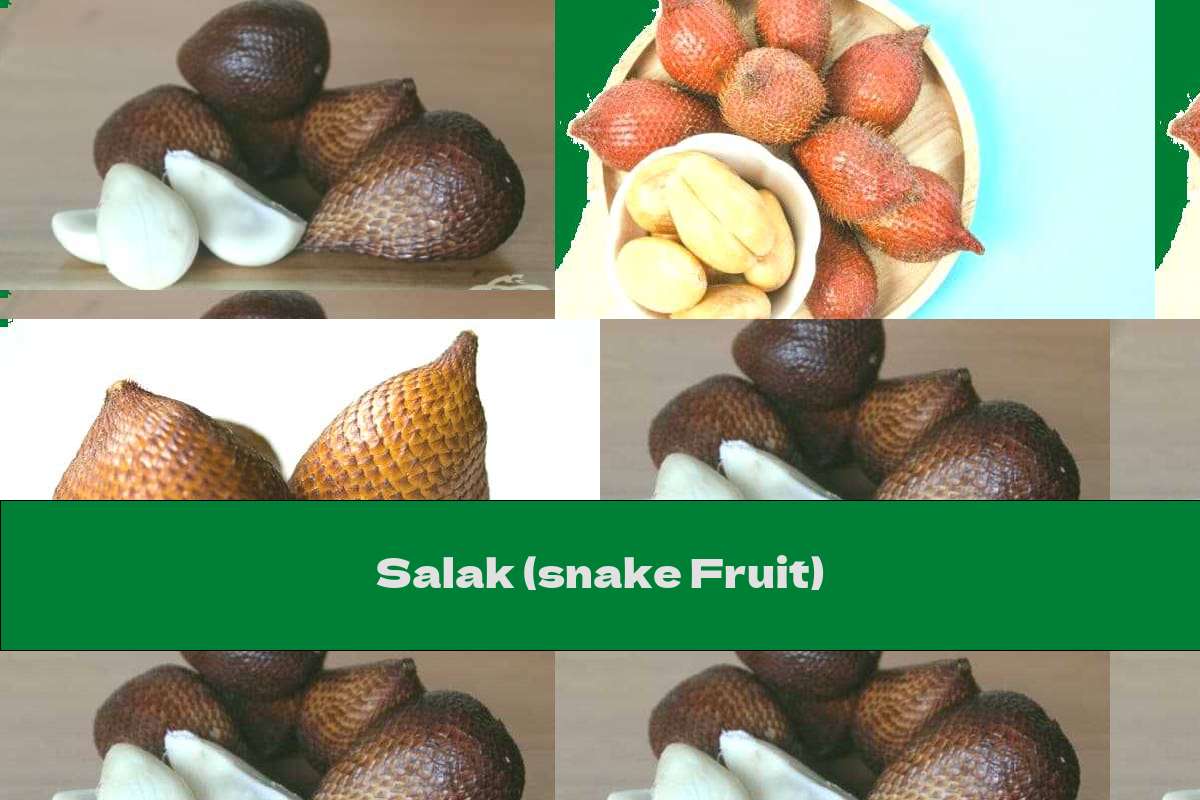Salak (snake Fruit)
 Author: Marko Balašević
Time for reading: ~3
minutes
Last Updated:
January 27, 2026
Author: Marko Balašević
Time for reading: ~3
minutes
Last Updated:
January 27, 2026

CHAPTERS (Table Of Contents)
In this article, learn more about Salak (snake Fruit). Salak (snake fruit).
Probably consuming a product called snake fruit is not tempting, but in some parts of the world, it is very popular.
Salak is the name of a palm tree that grows in Indonesia and part of the South Pacific. It is cultivated because of the fruits that grow near the base of the tree.
Their shape resembles a fig, and their shell, reddish and scaly, is the reason why they are likened to a snake.
The inside of the fruit is like garlic cloves, and they contain a hard seed. It is cleaned by breaking off the upper end of the fruit, and then easily peeled with your fingers. The taste is slightly sour and astringent, and the texture is like an apple.
There are about 30 different varieties of fruit, but they overlap to a large extent in their nutritional profile, and their main difference is in taste and texture.
Nutritional value
100 grams of fruit contain:
- 368 calories;
- 0.8 grams of protein;
- 12.1 grams of carbohydrates;
- 0.4 grams of fat;
- 38 milligrams of calcium;
- 18 milligrams of phosphorus;
- 3.2 milligrams of iron;
- 8.4 milligrams of vitamin C;
- 86 grams of water.
Health benefits
Salak fruit contains many vitamins and minerals - it contains protein, beta-carotene, vitamin C, calcium, phosphorus, iron and carbohydrates - all useful substances for the body. Beta-carotene is a powerful antioxidant that prevents cardiovascular disease and reduces the risk of stroke. There are 5 times more beta-carotene in herring than in watermelon.
Eye careSalak fruits are considered to be very good for eyesight. According to health studies, beta-carotene (which we have already said is part of the snake fruit) takes care of eye health. You know that carrots are one of the foods suitable for eye care. Well, you can enrich your menu by including salak. In this way you will easily get the necessary amounts of beta-carotene.
Something specific that salak helps is the fight against myopia. The vitamin A it contains is food for the eyes and directly affects myopia.
Stomach careSalak is a fruit full of carbohydrates, beta-carotene, calcium, tannin, flavonoid and saponin. These nutrients are important for our health. Tannin helps with diarrhea and improves digestion.
Improves memoryDue to the high amounts of potassium and pectin, salaki improves brain function and memory.
Controls blood sugarTea can be made from the peel of the fruit, which helps the regeneration of cells in the pancreas, which helps control blood sugar and diabetes. In addition, tea contains pterostilbelen, which is a means of lowering blood sugar.
Maintains heart healthPotassium in the fetus takes care of heart health. The high amount of antioxidants and minerals takes care of the proper functioning of the cardiovascular system and helps maintain the body's water balance.
Promotes the overall health of the bodySnake fruit is full of antioxidants, vitamins and minerals that help the body function properly. Antioxidants fight free radical damage, one of the main culprits for cancer.
Helps to lose weightDue to the high content of both fiber and antioxidants, the salad is suitable for eating when you are on a weight loss diet. It has calcium and carbohydrates and provides the necessary energy to the body. Tea is also useful for reducing weight.
Contraindications
Although snake fruit is rich in nutrients that are key to the health of the body, there are some cases in which it should not be consumed because the contraindications outweigh the benefits.
- Ulcer - If you suffer from an ulcer, avoid eating the fruit, as it contains a lot of protein, fiber and carbohydrates, which are absorbed slowly. Salax will stay in the stomach for a long time and therefore more acid will be released for its absorption, which is not suitable for people with ulcers.
- Constipation - as already mentioned, the fruit acts in diarrhea. So if you suffer from constipation, avoid eating the fruit.
- Typhoid - Typhoid is a serious disease of the digestive system caused by the bacterium Salmonella Typhi, which is spread through contaminated water, food and feces of an infected person. The fiber content in snake fruit worsens typhoid fever, so if you are infected with the bacterium, always consult a doctor before consuming something new and unfamiliar.